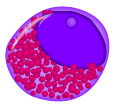Promyelocyte
Promyelocyte[edit | edit source]
A promyelocyte is a type of cell that is found in the bone marrow and is an important component of the body's immune system. It is classified as an intermediate stage in the development of white blood cells, specifically granulocytes, which are responsible for fighting off infections and foreign substances in the body.
Structure[edit | edit source]
Promyelocytes are characterized by their large size and distinct appearance under a microscope. They have a round or oval-shaped nucleus, which contains genetic material, and a relatively large amount of cytoplasm. The cytoplasm of a promyelocyte is rich in granules, which are small vesicles that contain enzymes and other substances involved in immune responses.
Function[edit | edit source]
The main function of promyelocytes is to differentiate into mature granulocytes, such as neutrophils, eosinophils, and basophils. This process is known as granulopoiesis and occurs in the bone marrow. During granulopoiesis, promyelocytes undergo several stages of maturation, gradually acquiring specific characteristics and functions.
Clinical Significance[edit | edit source]
Abnormalities in promyelocyte development can lead to various health conditions. For example, an increased number of promyelocytes in the blood may indicate a condition called promyelocytic leukemia, a type of acute myeloid leukemia. In this condition, the promyelocytes fail to mature properly and accumulate in the bone marrow and blood, interfering with normal blood cell production.
References[edit | edit source]
See Also[edit | edit source]
Search WikiMD
Ad.Tired of being Overweight? Try W8MD's physician weight loss program.
Semaglutide (Ozempic / Wegovy and Tirzepatide (Mounjaro / Zepbound) available.
Advertise on WikiMD
|
WikiMD's Wellness Encyclopedia |
| Let Food Be Thy Medicine Medicine Thy Food - Hippocrates |
Translate this page: - East Asian
中文,
日本,
한국어,
South Asian
हिन्दी,
தமிழ்,
తెలుగు,
Urdu,
ಕನ್ನಡ,
Southeast Asian
Indonesian,
Vietnamese,
Thai,
မြန်မာဘာသာ,
বাংলা
European
español,
Deutsch,
français,
Greek,
português do Brasil,
polski,
română,
русский,
Nederlands,
norsk,
svenska,
suomi,
Italian
Middle Eastern & African
عربى,
Turkish,
Persian,
Hebrew,
Afrikaans,
isiZulu,
Kiswahili,
Other
Bulgarian,
Hungarian,
Czech,
Swedish,
മലയാളം,
मराठी,
ਪੰਜਾਬੀ,
ગુજરાતી,
Portuguese,
Ukrainian
Medical Disclaimer: WikiMD is not a substitute for professional medical advice. The information on WikiMD is provided as an information resource only, may be incorrect, outdated or misleading, and is not to be used or relied on for any diagnostic or treatment purposes. Please consult your health care provider before making any healthcare decisions or for guidance about a specific medical condition. WikiMD expressly disclaims responsibility, and shall have no liability, for any damages, loss, injury, or liability whatsoever suffered as a result of your reliance on the information contained in this site. By visiting this site you agree to the foregoing terms and conditions, which may from time to time be changed or supplemented by WikiMD. If you do not agree to the foregoing terms and conditions, you should not enter or use this site. See full disclaimer.
Credits:Most images are courtesy of Wikimedia commons, and templates, categories Wikipedia, licensed under CC BY SA or similar.
Contributors: Prab R. Tumpati, MD








